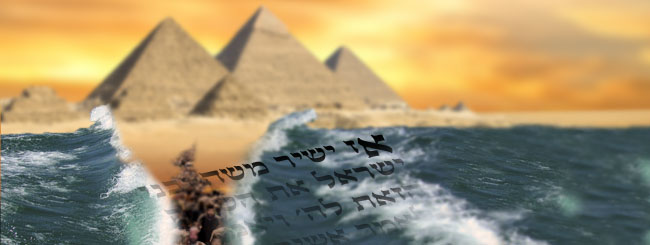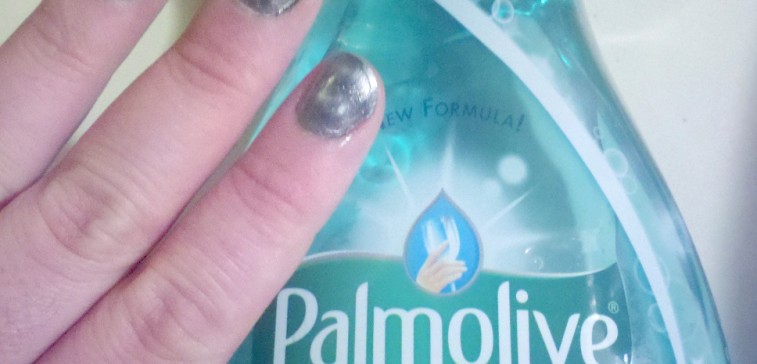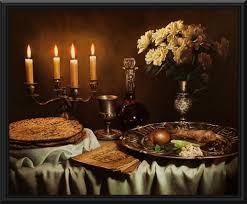BS’D
To view the latest emuna shiur on the DAILY DOSE OF EMUNA YouTube Channel: Freeing ourselves from emotional slavery PLUS seder insights:
Click here
“Lets really get rid of the chametz, no more loshon hora, lets all work on our Peh Sach, think before you speak!”



Pesach is filled with many messages of light and hope, the main one being emuna shleimah (complete and pure faith). The goal of this chag is to see ourselves as part of the Exodus and to thus feel Hashem’s loving care. Ideally, this will fortify us and create a meaningful, lasting relationship with Hashem.
Rav Avigdor Miller ztk’l teaches that the story of Mitzrayim is truly a model of the life of every Jewish soul. For instance, contemplating the course of Yosef HaTzaddik’s life, including the trials and tribulations that led him to become the viceroy of Egypt, allows us to witness the hand of Hashem guiding his affairs. There are so many ‘If Yosef had not’s’ and ‘He would have never’s’ that led him to be second in command over the largest country in the world at the time. If these events had not occurred, Yosef could not have made it to the top. Though it seemed he befell serious misfortunes, all events of Yosef’s life were benevolent and purposeful.
Just as we can study the life span and circumstances of Yosef’s life, in the future we will apply this perspective to our own lives. Chazal teach that in the World to Come, mankind will study and understand the meaning behind all events of our lives. Every minute event in our lives represents links that make up our Jewish path and together form our history. As Dovid HaMelech ztk’l writes in Tehillim (145:17) ‘Hashem is just is all of His ways and kind in all of His deeds’. We need to trust that all will be clear in due time.
We begin to eat matzah at the Pesach seder. Considered the poor man’s bread, matzah humbles us and reminds us of our former condition as slaves and how Hashem overturned nature in order to redeem His beloved children. This should fill our hearts with an outpouring of gratitude and happiness at the recollection of His abundant care.
Though there were numerous ways Hashem could have brought about our redemption He ‘chose’ to arrange the events in such a manner that His hand would be undoubtedly apparent. In his mercy, He sought to assure the Jewish people that Hashem was with them and they were not alone.
In our Tefillah we mention Yetziat Mitzrayim numerous times a day to recognize and be grateful for Hashem’s kindnesses to each and every one of us. ”V’heegaditah l’vinchah bayom hahu la’mor ba’avur zeh asah Hashem li b’tzaitee(And you shall relate to your son on that day, saying: because of this that Hashem did for me when I went out of Egypt).”
The Gemara writes (Sanhedrin 37A), ‘Kol HaOlam lo nivrah ella bishvilee (All the world was created for my sake alone). This belief should be echoed in our hearts every day, particularly when contemplating the exodus of Egypt, since each of us was there in spirit and was thus personally redeemed. Each of us is a guest in Hashem’s world. A good guest does not say, “Hashem doesn’t take the sun out just for me, the entire world enjoys its radiance, therefore what must I be thankful for!” Rather, a good guest feels that His host has troubled Himself specifically for him, even if others benefit from His hospitality.
Bedikat Chametz
We perform the ritual of bedikat chametz to the light of a single flickering candle. The candle represents our spiritual essence, that which goes beyond rationale and logic. Often in this world, our inflated egos trap us and disable us from opening up, loving ourselves and others and growing. While searching for the chometz, we can think of our true core and the chametz ‘hiding’ in us. We can visualize isolating this ego part and imagine burning it the following morning along with the last pieces of chometz before Pesach. In contrast, eating, matzah frees us from this egocentricity and confinement. Matzah gives us the strength to fight and be free.

The Seder
Rabbi Simon Jacobson shlit’a of “The Meaningful Life Center” in NY teaches that the entire objective of the seder is to achieve transcendence. The seder grants us the opportunity to break free from our fears, inhibitions and addictions.
The purpose of the Seder night is to reawaken the feelings of slavery and then to transition us to freedom. Human beings often experience emotions most strongly via contrast. By imagining ourselves in bondage and then being saved by Hashem, we are more able to feel in our hearts and thus acknowledge that we only have Hashem to rely upon. The true definition of freedom is recognizing that we are servants of an Omnipotent Being, that there is no one and nothing other than Hashem. This is the definition of living with emuna shleimah. This cements the understanding that we can therefore never be slaves to anyone or anything else.
Seeing ourselves in the story of the Hagaddah is immersing ourselves in history and in the past and future redemption. Every day of our lives we are required to come out of Mitzrayim, that is out of the constriction of our bodies and instead realize that we are G-dly. This mindset expresses freedom, unlimited potential, endless abilities and immeasurable capacity to grow. Hashem is infinite and limitless and therefore, when we attach ourselves to Him we are also limitless. Our identities expand and break free from the bonds of self and ego. We can recreate ourselves, our limits and our reality at any given time. Anything can happen at any time. The present moment is not static, it does not represent the future.
We do not have to live by rote or feel numb. Rather we can see our life in this world from a grander perspective. Since every one of our actions, thoughts and speech changes the universe, being chosen to co-create with Hashem is thus a tremendous task.
The Seder table
According to the AriZal, the three matzahs placed one on top of the other represent the three intellectual faculties: chochmah (wisdom or an initial spark when an idea ‘pops’ into our mind), binah (understanding or the process of unraveling the idea and analyzing it to grasp it in its entirety) and da’at (knowledge, or the resonating conclusion which brings us to act upon the initial thought).
The seder plate consists of ten items which are a reflection of our soul in its most ideal state. The Arizal uncovers the hidden meaning behind each of the seder plate items. The AriZal advises us to place the seder plate on top of the matzah arrangement (set up from the head of the table). The Seder plate should be set up with the zeroa (shank bone) placed on the top right of the plate (chesed, kindness). On the left of the zeroa we should place the egg (gevurah, strength).We should place the maror (bitter herbs- tiferet, beauty) in the middle of the plate. We should set the charoset (apple mix-netzach, eternity) on the right of the zeroa and set the karpas (hod-splendor) to the left of the charoset. Under the maror in the center set the chazeret (a sandwich of some of the elements eaten together) and represents yesod-foundation. The plate itself represents malchut, kingship, which includes within it all of the ten sefirot. Malchut is the means by which Hashem channels His creative force in this world and reveals Himself in this physical realm.
These elements on the Seder plate also symbolize different middot and emotions. A Torah observant Jew is called to the holy task of disciplining his emotions. We are expected to use self-discipline to channel our emotions to ensure that we act out of wisdom and not by impulse. In order to achieve this lofty aim we must humble ourselves and internalize that our wisdom and the ability to act comes from Hashem.
Specifically, the zeroa is symbolic of an outstretched arm, compassion, a giving nature to love and care for others. The egg represents discipline which is vital to regulate kindness and love, which must have boundaries in order to be effective. The maror invokes empathy, our ability to feel compassion for another one’s pain and suffering. The charoset reminds us the importance of endurance; to be strong and fortify our emuna. The hard labor, the difficulties that we undergo, should build up our strength and assist us to grow through every challenge. The karpas grows in the lowly earth and teaches us the importance of remaining humble. Finally, the chazeret is the bonding force that brings these middot together, eaten in the sandwich at the seder. In order to experience genuine and lasting emotional and spiritual freedom we must unite with those we love and with Hashem.
In its entirety the seder plate represents kingship; selflessness. Royalty comes as a result of being related to those of royal heritage- we are a light onto nations, a holy nation. The epitome of healthy self-confidence is knowing where we come from and the G-dly power that lies within us awaiting to be redeemed.
Special Segulot to keep in mind beginning Shabbat HaGadol (Shabbat immediately before Pesach – Apr. 12, 2019), throughout Pesach until the last day of Pesach:
• Shabbot Hagadol: the Shabbot before Pesach: prepare stories on yitzias mitzrayim. It injects life into the upcoming seder and makes it real for our children. Try to relate a story each referring to marror, matzah and Pesach. Marror: anything that talks of our ability to do something above our own means, with great strength. Matzah: the strength to cope with the circumstances that are handed down to us. How? Through connecting to Hashem and drawing strength from our relationship with Him. Pesach: anything that talks about our geula, our redemption, B’H.
• Before lighting Shabbos candles on Shabbot Hagadol accept upon yourself a small mitzvah; i.e. netilat yadayim next to the bed, birkat hamazon with kavannah (special intent) from a siddur, etc.. This opens a small pathway where decrees and judgments that might be c’v hovering over can pass over us.
• During bedikat chametz, it is a time where all of our transgressions are collected and wiped away. It is just like kol nidrei of Yom Kippur. Whoever does the bedikah properly, without talking from start to finish and with full sincerity, will be shown the root of his soul’s rectification. This will come to him in the form of the first thought that enters his mind right after he completes the bedikah and before he extinguishes the candle. During the bedikah it is an auspicious time to pray. For instance while checking your bedroom: “Hashem, may I be blessed with Shalom bayit, marital peace, love and light in our home”. While checking your children’s rooms pray that each one will be blessed with….
• Write down on 10 separate little pieces of paper 10 negative character traits (middot) that you want to get rid yourself of: fear, worries, bitterness, anxiety, anger, stinginess, depression, stubborness, etc. and/or financial debts. When you burn your chametz throw them into the fire together with the 10 pieces of bread collected from bedikat chametz, the lulav from Succot and, the wicks from Chanukah/Shabbot candles. The fire cleanses us and cancels out decrees. You can also throw into the fire anything you would like to cancel; i.e. your apartment rental agreement (so that you can own an apartment and not have to rent!), bad medical test results, debt collector notes or anything else that you would like to have burnt away… Do not throw into the fire names of people you would like to get rid of, ha ha!
• While preparing the seder plate talk to Hashem and pray to Him:
– Marror: Hashem may it be Your will that we will be surrounded by sweetness
– Egg: may it be Your will that we will have wonderful simchas to celebrate
– Zaroa: save me with Your kind hand from harm
– Charoset: sweeten the sorrows and sadness
• While preparing the table, ask for parnassa.
• There is a segula to say the special tefillah of Rebbi Shimshon M’Astropoli ztk’l on erev Pesach which is found in the Pesach siddur. Those that say this special prayer will be saved from 10 harsh decrees this year, r”l.
• During Kiddush at the seder the Chofetz Chaim ztk’l brings down that all of your deceased relatives come to hear Kiddush with you. Feel their closeness and presence. This is a special time to ask for your soulmate.
• First cup of wine represents Sarah Imeinu, second cup represents Rivkah, third cup represents Rachel Imeinu ask for parnassa and fourth cup represents Leah.
• While eating the celery think about the hatred that still lies within our own nation. Sinas chinam (baseless hatred) was the main cause that lead our nation into slavery, because of Yoseph’s brothers’ hatred and jealousy.
• מה נשתנה: during this time ask Hashem for something that has gone unanswered in the past. Beseech Hashem’s blessing in a way of a story not a request, “Hashem why is this night different from other nights?? I thought that this night I would have be married, I would have….. I sway from place to place and nothing has changed.”
• יחץ: ask Hashem to complete that which is missing in your life
• Say the hagaddah out loud and each word; this repairs the lashon hara that we’ve spoken.
• רחצה: we ask Hashem that we and our daughters should serve Him with purity and keep all of the laws of purity/ taharat hamishpacha.
• Matzah: it is the bread of refuah. We ask Hashem to heal us mentally and physically. “Hashem please remove any sickness within me.”
• מרור כורך: we ask Hashem to surround our bitterness with sweetness. Even though we feel bitterness through trials and tribulations, “Hashem allow me to feel your everlasting kindness and good.”
• צפון: we ask, “Hashem please grant me presents that I never imagined I will ever receive…” Specify.
• ברך: “May it be Your will Hashem that I should always have the zechut to thank you and recognize all of the good that you do for me. Just as I request from you parnassa, may I merit to thank you in the same way that I ask you to give me.”
• חצות הלילה, chatzot halayla, usually around 12:41 am on the evening of the seder and also on the last evening of Pesach. These are very special times, where the gates of heaven are open and many bad decrees can be annulled and prayers can be answered more readily.
Try to sing שיר השירים at this time it is a time of great love and connection to Hashem. On the last day of Pesach, at this time pray for shidduchim, parnassa, and health from sickness. They are likened to kriat yam suf (the opening of the Sea of Reeds) this is the exact time when Hashem split the sea.
(Check back during Pesach for more insights into the last days of Pesach and segulot, that will be added to this page)
• נרצה: we ask from Hashem that we should always be happy and that He should always be happy with us as He is tonight.
• Before eating the afikoman, the one who hands out the pieces of the afikoman should ask before handing it out to each one at the table, ‘What would you like’ and then bless them with their request and everyone should answer Amen. This is a Chassidic custom that was practiced by Reb Carlebach ztk’l.
• When mentioning the plagues and dipping the finger into the wine and dropping it into a separate bowl, think about how you are emptying out all of the plagues from within you and throwing them away.
• At the seder while we sing our praises to Hashem, He is sitting with us, the gates of heaven are opened and Hashem ‘comes down’ so to speak to be with us.
• Don’t forget those who aren’t with their families ie; Yonatan Halevi Pollard ben Malkah, Shalom Mordechai Rubashkin ben Rivkah, and others who are still in prison or sick in hospitals and l’havdil the Fogel family that were slaughtered by Arabs, Daniel Arie Viflic z’l ben Tamar and Yitzchok, the Sandler family massacred in Toulose France, the Saeur family who perished in a fire, our brethren that were injured in the past by terrorists (amongst them Odelya Nechama bat Michal, who is still in a coma) and soldiers that were injured in past wars or died, those who are elderly and alone, those that are not in teshuva and don’t celebrate the chag, those who are widowed, those who are single, waiting to get pregnant, etc..
• During the seder mention a miracle that happened to you in your life, this will ‘encourages’ more miracles to happen in your life.
• Don’t forget to break off and keep a tiny piece of the afikoman, wrap it up well in foil and then in a bag and place it somewhere in your home where no one will touch it all year long to protect your home and a small piece in your wallet/purse for parnassa.
• Also don’t forget to keep some matzah from the seder for Pesach sheini, which comes out on יד’ אייר. There is a special segula to eat matza from the seder on this day.
• Also keep some matzah in a plastic bag in the freezer to eat on Rosh Hashanah, B’H, this year at the Rosh Hashanah seder. It annuls harsh decrees c’v hanging over us in the beginning of the year.
May it be your will Hashem that this will be the last Pesach celebrated as a nation separated by darkness, confusion and suffering and that we will truly come together as Your bride and greet You in Yerushalayim in Your palace, b’mheira, b’rachamim, Amen!


It’s Never Too Early to Teach Your Children Emuna!
“GIVE YOUR CHILD A BEAUTIFUL PICTURE BOOK THIS PESACH”


















